

Should we engineer animals to be smart like humans? What if it were possible to engineer animals to be as intelligent as us?
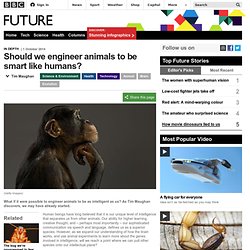
Chimpanzees granted petition to hear 'legal persons' status in court. For the first time in US history, a judge has granted two chimpanzees a petition – through human attorneys – to defend their rights against unlawful imprisonment, allowing a hearing on the status of “legal persons” for the primates.
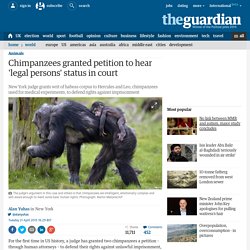
On Monday, Manhattan supreme court justice Barbara Jaffe granted a writ of habeas corpus on behalf of two non-human plaintiffs, Hercules and Leo – chimpanzees used for medical experiments at Stony Brook University on Long Island. In her order, Jaffe ordered Samuel Stanley Jr, the president of Stony Brook, to argue before the court why the chimpanzees were being “unlawfully detained” at his university and should not be transferred to a primate sanctuary in Florida. On Tuesday afternoon she struck the words “writ of habeas corpus” from the order, in order to clarify that she had not meant to imply the chimpanzees have legal person status.
December 6-8 2013 Yale University, New Haven CT. No, dolphins are not your 'therapists.' So just stop it. I strongly suspect that both asshole and magical dolphin stereotypes are just extreme generalizations.

Dolphins probably have a wide range of personalities from great to shitty. A pod of dolphins has lived for many many years in the saltwater marsh and river in front of my father's house in South Carolina (behind Hilton Head.) There are usually around...kind of hard to say, like 20 there? New babies get born, and we name them, and then the babies get bigger, and hang around in the teenage group (really), eventually get trusted with babysitting duties, move on up, etc. I'm not sure if the boys get kicked out and the mothers stay, or what. Wild dolphins exchange names when they meet at sea. - Seriously, Science? Chimps 'talk' about favourite fruits, best trees › News in Science (ABC Science) News in Science Tuesday, 20 January 2015 Jennifer ViegasDiscovery News Primate communication Researchers eavesdropping on wild chimpanzees have determined that the primates communicate about at least two things: their favourite fruits and the trees where these fruits can be found.
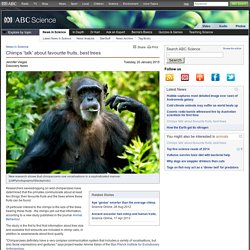
Of particular interest to the chimps is the size of the trees bearing these fruits - the chimps yell out that information, according to a new study published in the journal Animal Behaviour. The study is the first to find that information about tree size and available fruit amounts are included in chimp calls, in addition to assessments about food quality. "Chimpanzees definitely have a very complex communication system that includes a variety of vocalisations, but also facial expressions and gestures," says project leader Ammie Kalan of the Max Planck Institute for Evolutionary Anthropology.
The researchers found that higher pitched calls were produced when the chimps encountered fruits from Nauclea trees. Court Cases : The Nonhuman Rights Project. Reviewing the Case of Sandra the Orangutan in Argentine Posted by NhRP on December 24, 2014 · Leave a Comment December 24, 2014: The Nonhuman Rights Project has been following the December 18, 2014, appellate court ruling concerning Sandra the orangutan.

The initial media reports were expansive and contained numerous exciting quotations from the judges’ decision. We downloaded the … The Nonhuman Rights Project. George Dvorsky. George P.
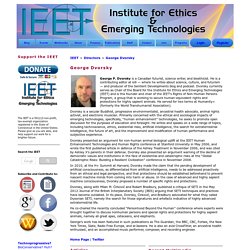
Dvorsky is a Canadian futurist, science writer, and bioethicist. He is a contributing editor at io9 — where he writes about science, culture, and futurism — and producer of the Sentient Developments blog and podcast. Dvorsky currently serves as Chair of the Board for the Institute for Ethics and Emerging Technologies (IEET) and is the founder and chair of the IEET’s Rights of Non-Human Persons Program, a group that is working to secure human-equivalent rights and protections for highly sapient animals.
He served for two terms at Humanity+ (formerly the World Transhumanist Association). IEET Rights of Non-Human Persons Program. The Institute for Ethics and Emerging Technologies (IEET) is committed to the idea that some non-human animals meet the criteria of legal personhood and thus are deserving of specific rights and protections.
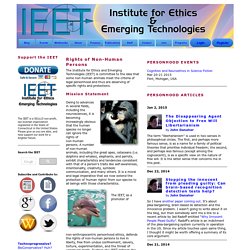
Owing to advances in several fields, including the neurosciences, it is becoming increasingly obvious that the human species no longer can ignore the rights of non-human persons. A number of non-human animals, including the great apes, cetaceans (i.e. dolphins and whales), elephants, and parrots, exhibit characteristics and tendencies consistent with that of a person's traits like self-awareness, intentionality, creativity, symbolic communication, and many others. It is a moral and legal imperative that we now extend the protection of 'human rights' from our species to all beings with those characteristics. No, India did not just grant dolphins the status of humans. An Orangutan Has (Some) Human Rights, Argentine Court Rules. Sandra, a 28-year-old orangutan now living at the Buenos Aires Zoo.

Roger Schultz/Flickr An orangutan named Sandra has become the first non-human animal recognized as a person in a court of law. The Association of Officials and Lawyers for Animal Rights, an animal advocacy group, had asked Argentine courts recognize the 28-year-old great ape’s right to freedom from unjust imprisonment. On Friday, an appeals court declared that Sandra, who is owned by the Buenos Aires Zoo, is a “non-human person” who has been wrongfully deprived of her freedom. Chimpanzee in Argentina given non-human status, some basic human rights. See photos for The orangutan named Sandra sits in her enclosure at Buenos Aires’ Zoo in Buenos Aires, Argentina, Monday.
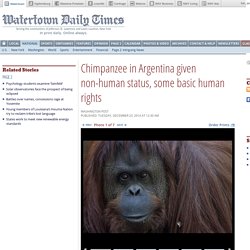
An Argentine court has ruled that Sandra, who has spent 20 years at the zoo, should be recognized as a person with a right to freedom. The ruling would free Sandra from captivity and have her transferred to a nature sanctuary in Brazil after a court recognized the primate as a “non-human person” which has some basic human rights. In recent months, animal rights advocacy groups have worked to free primates from captivity by representing them in court, fighting for the animals’ rights to be recognized as non-human “people.”
In the United States, chimpanzees are losing trials left and right. Primer on Non-Human Personhood and Cetacean Rights. Professor Thomas I White argues that dolphins are non-human persons.

Like humans, then, they have moral rights appropriate to their nature. White argues that the scientific data of the last thirty years makes it quite clear that the slaughter and captivity of dolphins are ethically indefensible. He argues further that anyone who doesn't recognize this is either unfamiliar with the full body of relevant scientific literature or doesn't understand the ethical significance of the data. Watch this recent video of a talk (July 2014) given by Professor White: Professor Thomas I. When does an animal count as a person? I can't agree with what Shook has to say, at all. I mean, what exactly would be the problem with recognizing all life as essentially equal? We're all made of the same stuff, and every living thing has at least basic senses. That by itself is reason enough to regard all life as precious and potentially conscious (even if only infinitesimally so, in certain cases).
That doesn't mean we all have to become Jains and wear masks and sweep the ground in front of us on the off chance we might inhale or step on a bug. Are Nonhuman Animals Persons? 1.1 Basic Moral Principles and the Importance of the Concept of a Person Why should the concept of a person enter into basic moral principles concerned with identifying when and why the destruction of something is seriously wrong, not because of its impact upon other things, but because it wrongs the thing destroyed? For traditionally, it has often been thought that the basic principle in this area is that the killing (or, perhaps, the direct killing) of innocent members of the species Homo sapiens is prima facie intrinsically wrong, and seriously so.
Thus formulated, however, the principle is not a satisfactory candidate for a basic moral principle, for three reasons. First, there are excellent grounds for holding that being an innocent member of the biologically defined species Homo sapiens does not itself make it prima facie wrong to kill a thing, because, if such an entity has suffered either whole-brain death, or upper-brain death, killing is not prima facie seriously wrong. Jacques Cousteau - There’s about as much educational benefit... ADW ~ Animals ~ Album Two - Inside the Divine Pattern. Declaration of Rights for Cetaceans: Whales and Dolphins - CetaceanRights.org. Dolphins deserve same rights as humans, say scientists. 21 February 2012Last updated at 15:54 Recognising the rights of dolphins would end whaling and their captivity Dolphins should be treated as non-human "persons", with their rights to life and liberty respected, scientists meeting in Canada have been told.
Experts in philosophy, conservation and animal behaviour want support for a Declaration of Rights for Cetaceans. They believe dolphins and whales are sufficiently intelligent to justify the same ethical considerations as humans. Recognising their rights would mean an end to whaling and their captivity, or their use in entertainment. Continue reading the main story “Start Quote. Man in the Middle: Animals, Humans and Robots. Moral Moments by Joel Marks Humans used to be thought of as occupying an existential space between animals and gods. Clearly our bodies display our affinity to animals, while our minds possess intellectual and moral capacities seemingly beyond the reach of physical objects.
This even led some to identify us with either animals (we are mammals) or gods (we are immortal, immaterial souls). Alëna Iouguina on Twitter: "Veterinarian of @socp_tweets conducts medical exam on orangutan found with air gun metal pellets embedded in his body. Non-human. Chimpanzees are not people, New York court decides. A chimpanzee is not a legal person, a New York appeals court has decided, saying that no matter how great apes are, they cannot give back to society in a way that merits human rights. Rejecting an animal rights group’s bid to expand the definition of “legal person” to chimpanzees, a five-judge panel found that although the animals are autonomous beings they do not take part in the societal bargains that guarantee rights like bodily freedom.
Orangutan in Argentina zoo recognised by court as 'non-human person' Court Rules Orangutan Held In Argentina Zoo Is 'Non-Human Person' And Can Be Freed. Is personhood an animal right or human privilege? - The Philosopher's Zone. Divers Attempt to Communicate With Wild Dolphins, Using A Two-Way Translation Device. Dolphins can understand more than 100 words, decipher human instructions and even use iPads to learn basic communication skills. Dolphin whistle instantly translated by computer - life - 26 March 2014. Software has performed the first real-time translation of a dolphin whistle – and better data tools are giving fresh insights into primate communication too.
Dolphin 'translator' aids human-animal interaction. Marine biologists have developed a dolphin "translator" that helps humans identify individual whistles of animals underwater by converting them into English words. The Cetacean Hearing and Telemetry (CHAT) has been developed by the Wild Dolphin Project. India declares dolphins to be "Non-Human Persons" - The Shake. Dolphins gain unprecedented protection in India. India bans captive dolphin shows, says dolphins should be seen as ‘non-human persons’